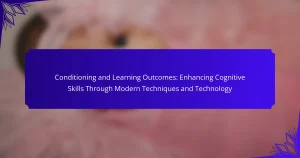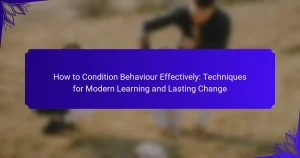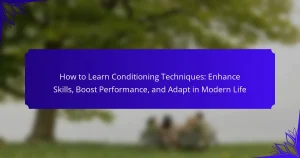Fostering lifelong learning is essential for personal and professional growth. This article explores adaptive techniques, including personalized learning plans, digital tools like online courses, and mindfulness practices to enhance focus and retention. By integrating these elements, learners can create effective and engaging educational experiences tailored to their individual needs. Embracing these strategies supports continuous development throughout life.
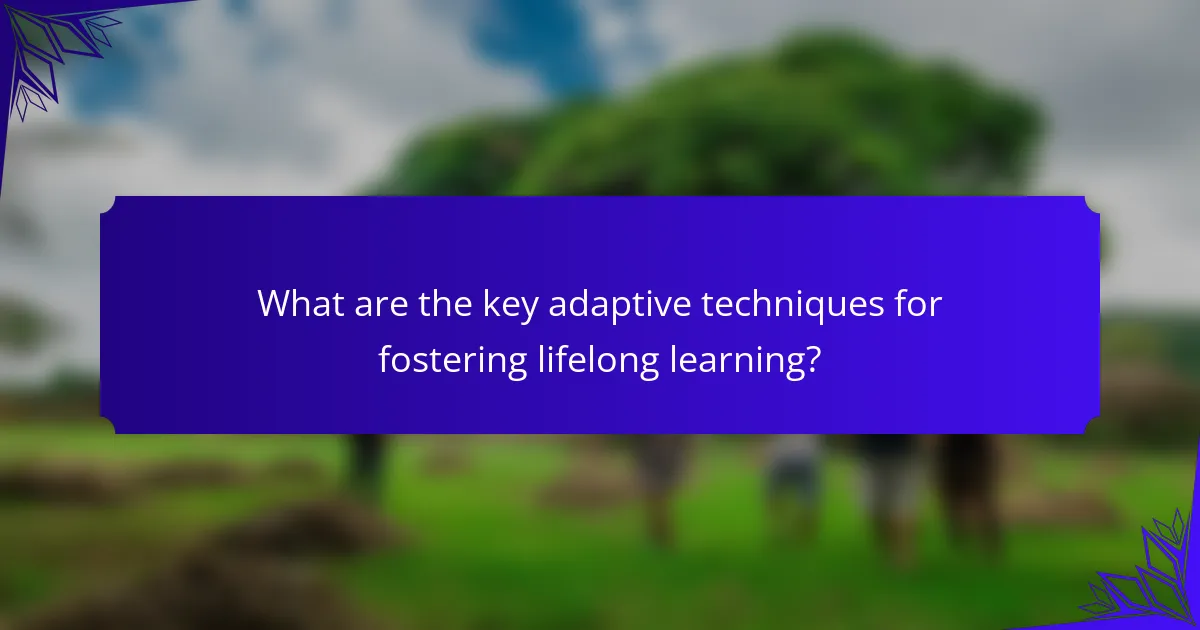
What are the key adaptive techniques for fostering lifelong learning?
To foster lifelong learning, adaptive techniques include personalized learning plans, digital tools, and mindfulness practices. These techniques enhance engagement and retention.
Personalized learning plans tailor education to individual needs, promoting motivation and self-direction. Digital tools such as online courses and educational apps offer flexible learning environments, enabling access to diverse resources. Mindfulness practices improve focus and reduce stress, creating a conducive atmosphere for learning.
Incorporating these adaptive techniques leads to a more effective and enjoyable lifelong learning experience.
How do adaptive techniques enhance learning experiences?
Adaptive techniques significantly enhance learning experiences by personalizing education to individual needs. These methods utilize data-driven insights to tailor content, pacing, and learning paths. As a result, learners engage more deeply, retain information better, and develop critical thinking skills. Adaptive learning tools can adjust in real-time, offering immediate feedback and support to foster growth. This personalized approach not only boosts motivation but also cultivates a lifelong learning mindset.
What role does personalization play in adaptive learning?
Personalization enhances adaptive learning by tailoring educational experiences to individual needs and preferences. This approach increases engagement and retention, facilitating lifelong learning. Personalized pathways allow learners to progress at their own pace, addressing unique strengths and weaknesses. As a result, adaptive techniques foster a more effective and meaningful learning journey.
What are effective strategies for tailoring learning experiences?
To tailor learning experiences effectively, utilize adaptive techniques, digital tools, and mindfulness practices. Adaptive techniques personalize learning paths based on individual needs, enhancing engagement. Digital tools, such as learning management systems, provide interactive content and real-time feedback. Mindfulness practices foster focus and emotional regulation, improving retention and application of knowledge. Combining these strategies creates a holistic approach to lifelong learning.
How can feedback be utilized in adaptive learning environments?
Feedback is essential in adaptive learning environments as it informs personalized learning paths. It allows educators to adjust content and strategies based on individual learner progress and needs. Regular feedback enhances engagement and motivation, fostering a culture of continuous improvement. This process supports the unique attribute of adaptability, ensuring that learning experiences are tailored to each student’s strengths and weaknesses. Effective feedback mechanisms can include real-time assessments and peer reviews, which provide immediate insights into performance. As a result, utilizing feedback effectively can significantly enhance the overall effectiveness of adaptive learning techniques.
What types of feedback are most beneficial?
Constructive feedback, peer reviews, and self-assessments are the most beneficial types of feedback for fostering lifelong learning. Constructive feedback provides specific guidance for improvement, while peer reviews encourage collaboration and diverse perspectives. Self-assessments promote self-reflection, allowing learners to identify their strengths and areas for growth. Each type enhances adaptability in learning techniques, making them vital for continuous personal development.
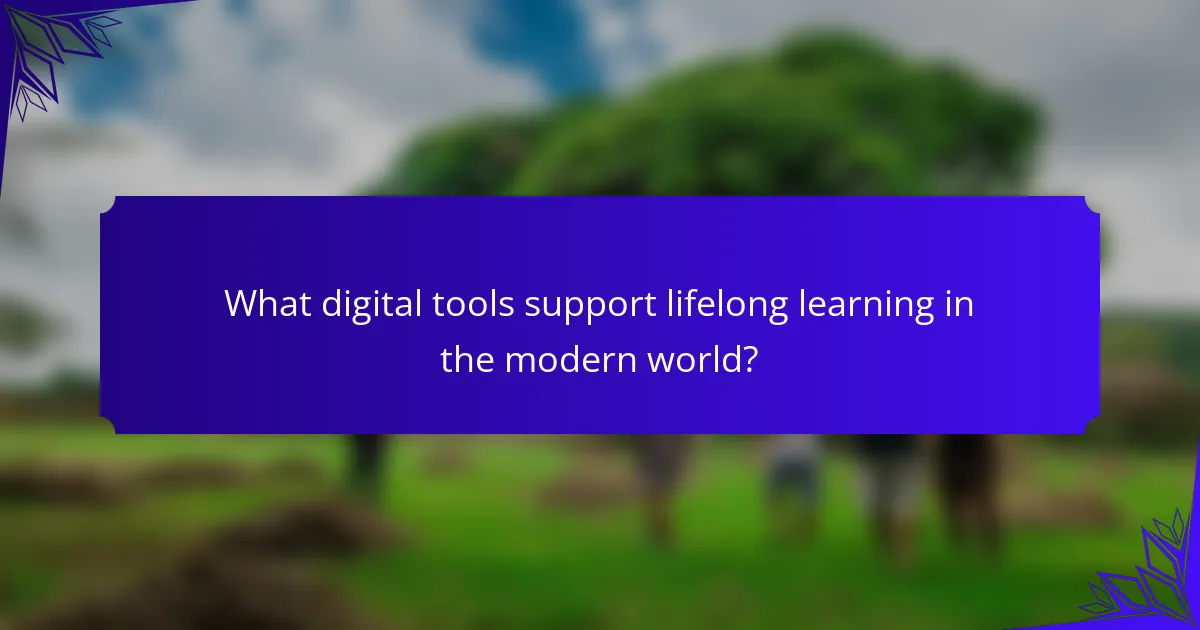
What digital tools support lifelong learning in the modern world?
Digital tools that support lifelong learning include online courses, educational apps, and collaborative platforms. These resources enhance learning flexibility and accessibility. For example, platforms like Coursera and Udemy offer a variety of courses tailored to different interests and skill levels. Additionally, tools like Google Classroom facilitate collaborative learning and communication. Mindfulness apps, such as Headspace, contribute by promoting mental well-being, which is essential for effective learning. Embracing these digital tools fosters a continuous learning environment that adapts to individual needs.
Which platforms offer the best resources for online learning?
Online learning resources are abundant on platforms like Coursera, edX, and Khan Academy. These platforms provide diverse courses, adaptive learning technologies, and mindfulness practices to enhance lifelong learning.
Coursera offers courses from top universities, focusing on flexibility and skill development. edX emphasizes interactive learning and certifications, catering to various subjects. Khan Academy provides free resources, promoting self-paced learning and mindfulness techniques.
Each platform utilizes digital tools that support personalized learning experiences. For instance, adaptive algorithms help tailor content based on user progress, fostering engagement and retention.
Overall, these platforms create environments conducive to continuous education, integrating modern techniques to meet learners’ evolving needs.
What are the features of top learning management systems?
Top learning management systems feature personalized learning paths, robust analytics, mobile accessibility, and integration capabilities. These attributes enhance user engagement and adaptability. Personalization allows tailored experiences, while analytics provide insights into learner progress. Mobile accessibility ensures learning can occur anytime, anywhere. Integration capabilities enable seamless connections with other digital tools, fostering a cohesive learning environment.
How can mobile apps facilitate continuous education?
Mobile apps can significantly enhance continuous education by providing personalized learning experiences. They offer adaptive techniques that adjust to individual learning styles and progress, ensuring engagement.
Apps facilitate access to a variety of educational resources, including courses, videos, and articles, promoting lifelong learning. Features like reminders and progress tracking encourage consistent study habits.
Moreover, mindfulness practices integrated into these apps help users manage stress and maintain focus, further supporting their educational journey. The combination of digital tools and adaptive learning fosters an environment conducive to ongoing personal and professional development.
What emerging technologies are shaping the future of learning?
Emerging technologies like artificial intelligence, virtual reality, and data analytics are transforming learning. These tools enable personalized education, enhance engagement, and foster continuous skill development. For instance, AI-driven platforms adapt content to individual learning paces, while virtual reality immerses learners in interactive experiences. Data analytics track progress and inform instructional strategies, ensuring effective learning outcomes. Embracing these technologies cultivates a dynamic learning environment that supports lifelong education.
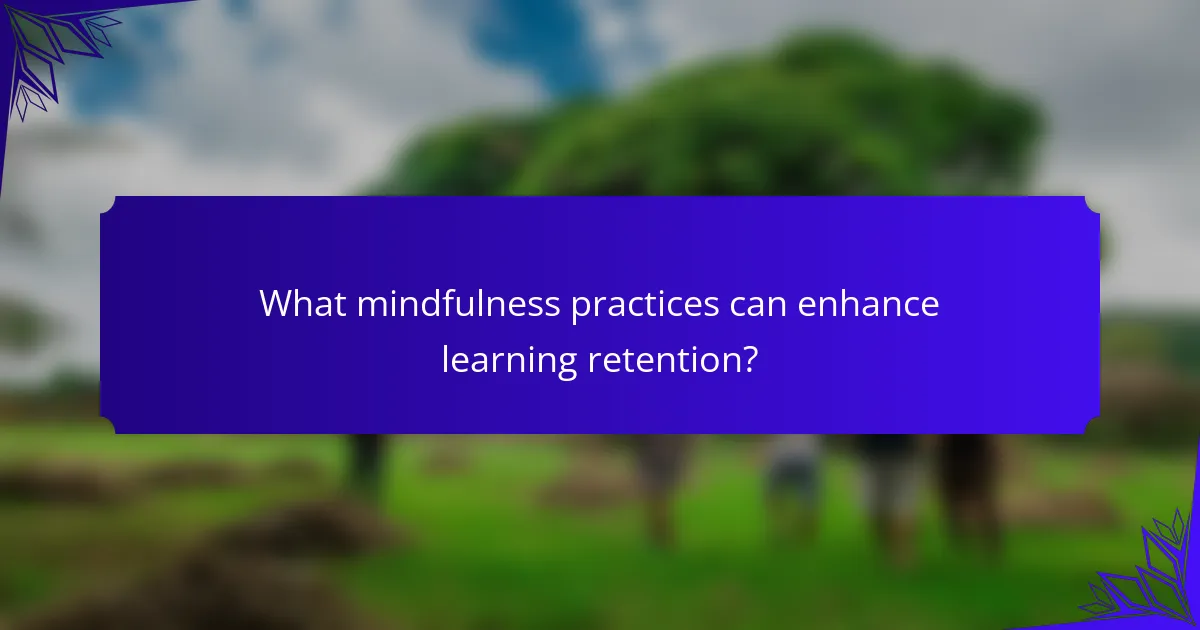
What mindfulness practices can enhance learning retention?
Mindfulness practices can significantly enhance learning retention by promoting focus and reducing distractions. Techniques such as meditation, mindful breathing, and body scans can improve cognitive function. Research indicates that regular mindfulness practice increases attention span and memory recall. Additionally, integrating mindfulness into study routines fosters a deeper understanding of material, leading to long-term retention.
How does mindfulness improve focus and concentration during learning?
Mindfulness enhances focus and concentration during learning by promoting present-moment awareness and reducing distractions. This practice encourages deeper engagement with material, leading to improved retention. Studies indicate that mindfulness training can increase attention span and cognitive flexibility, essential for effective learning. Additionally, incorporating mindfulness techniques, such as breathing exercises, can help learners manage stress, further enhancing their ability to concentrate.
What specific mindfulness techniques are effective for learners?
Mindfulness techniques such as meditation, deep breathing, and mindful observation are effective for learners. These practices enhance focus, reduce stress, and improve retention. Meditation encourages self-awareness and emotional regulation, while deep breathing techniques promote relaxation and clarity. Mindful observation cultivates attention to detail and enhances critical thinking. Regular practice of these techniques can lead to improved academic performance and lifelong learning habits.
How can meditation be integrated into study routines?
Meditation can enhance study routines by improving focus and reducing stress. Integrating meditation involves setting aside specific times for practice, using guided sessions, and applying mindfulness techniques during study breaks. Consistent practice fosters a calm mind, which can lead to better retention and understanding of material. Incorporating digital tools, such as meditation apps, can provide structure and accessibility, making it easier to maintain a routine.
What are the benefits of mindfulness in educational settings?
Mindfulness in educational settings enhances focus, reduces stress, and improves emotional regulation. It fosters a positive learning environment, promoting engagement and resilience among students. Research indicates that mindfulness practices can lead to higher academic performance and better interpersonal relationships. Schools incorporating mindfulness report improved classroom behavior and increased student well-being.
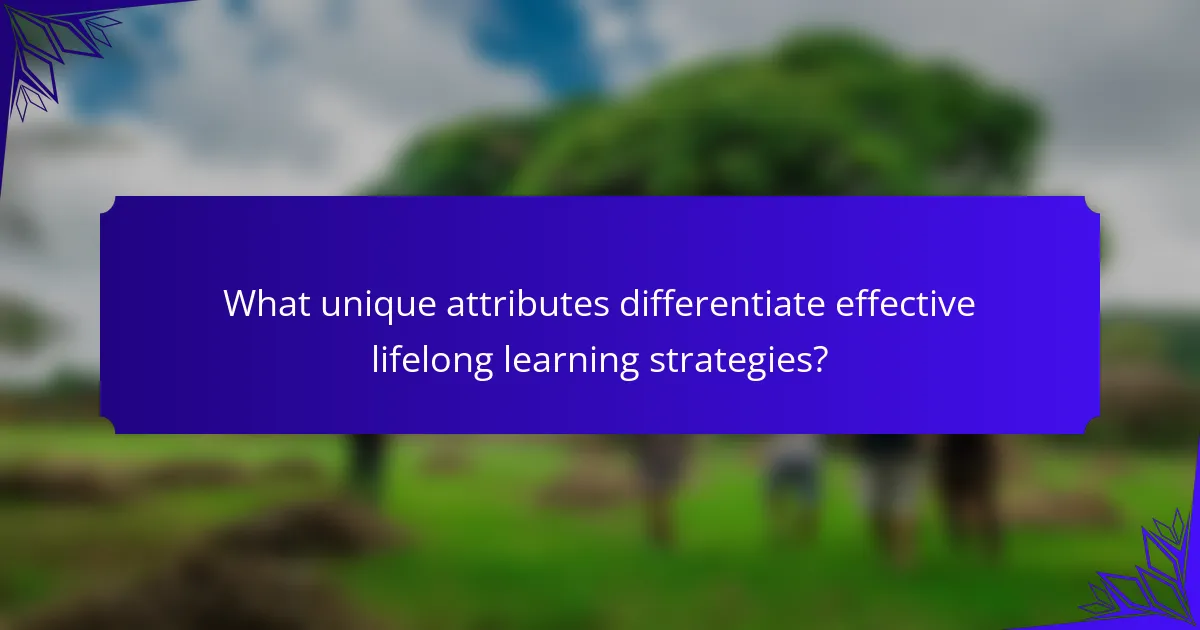
What unique attributes differentiate effective lifelong learning strategies?
Effective lifelong learning strategies are distinguished by their adaptability, integration of digital tools, and incorporation of mindfulness practices. These unique attributes enhance motivation, foster engagement, and promote self-directed learning. Adaptive techniques allow learners to tailor their experiences, ensuring relevance and effectiveness. Digital tools provide access to vast resources and facilitate collaboration, while mindfulness practices improve focus and retention. Together, these elements create a holistic approach that supports continuous growth and development throughout life.
How does self-directed learning empower individuals?
Self-directed learning empowers individuals by fostering autonomy and adaptability in their educational journeys. It encourages personal responsibility for learning, allowing individuals to set their own goals and pursue knowledge at their own pace. This approach enhances critical thinking and problem-solving skills, as learners actively engage with materials and seek out resources. Moreover, self-directed learning cultivates resilience, enabling individuals to overcome challenges and adapt to new environments. By leveraging digital tools and mindfulness practices, learners can enhance their focus and motivation, driving lifelong learning.
What role does curiosity play in lifelong learning?
Curiosity is essential for lifelong learning as it drives motivation and engagement. It encourages exploration and the pursuit of knowledge, enabling individuals to adapt to new information and experiences. Research shows that curious learners retain information better and develop critical thinking skills. By fostering curiosity through adaptive techniques, digital tools, and mindfulness practices, individuals can create a dynamic learning environment that supports continuous growth.
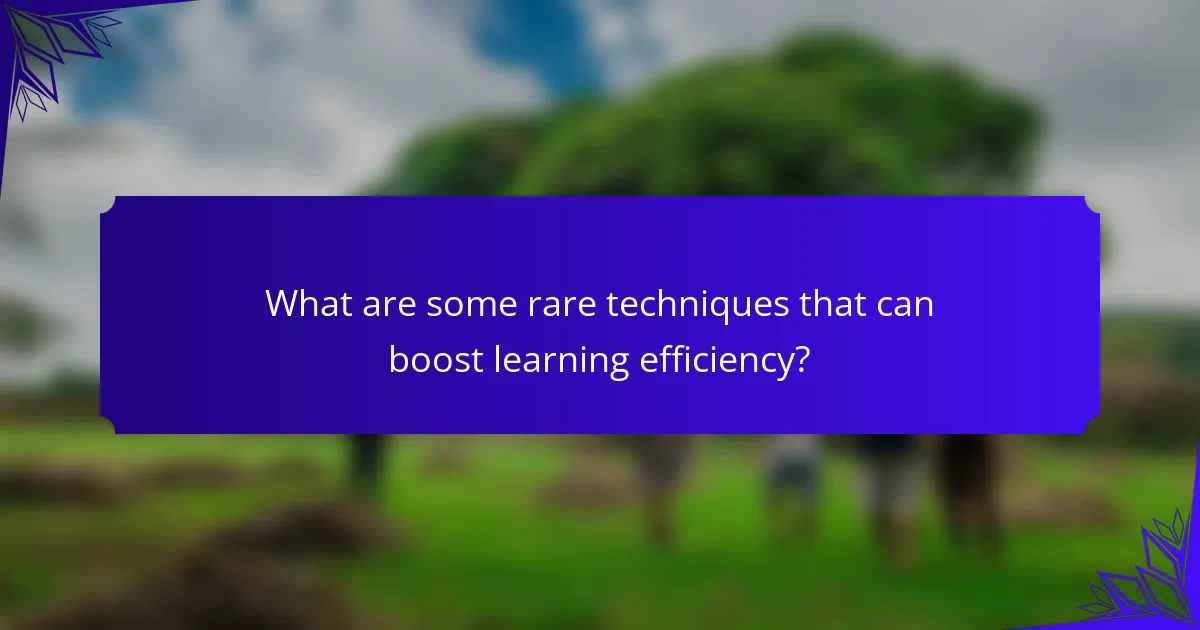
What are some rare techniques that can boost learning efficiency?
Utilizing rare techniques can significantly enhance learning efficiency. Techniques such as the Feynman Technique, which involves teaching concepts to others, and the Pomodoro Technique, which encourages focused work intervals, are effective. Additionally, spaced repetition, a method that optimizes memory retention by revisiting information at increasing intervals, can be rare yet powerful. Engaging in metacognitive strategies, where learners assess their understanding and adjust their approaches, further boosts efficiency. Embracing these unique techniques fosters a more adaptive and effective learning environment.
How can gamification enhance the learning process?
Gamification enhances the learning process by making it more engaging and interactive. It incorporates game design elements to motivate learners, fostering a sense of achievement and competition.
Through adaptive techniques, gamification personalizes learning experiences, catering to individual needs and preferences. Digital tools facilitate real-time feedback and progress tracking, allowing learners to see their advancements. Mindfulness practices integrated into gamification can enhance focus and retention, making the learning experience more effective.
As a result, gamification not only improves knowledge retention but also encourages a lifelong learning mindset.
What unconventional learning methods have shown success?
Unconventional learning methods such as experiential learning, project-based learning, and gamification have shown significant success. Experiential learning emphasizes hands-on experiences, enhancing retention and engagement. Project-based learning fosters collaboration and critical thinking by allowing learners to tackle real-world problems. Gamification incorporates game elements to motivate and increase participation, making learning enjoyable and effective. These methods adapt to diverse learning styles, promoting lifelong learning.
How can storytelling be used as a powerful learning tool?
Storytelling enhances learning by making information relatable and memorable. It fosters engagement, promotes critical thinking, and encourages emotional connections. By weaving narratives into educational content, learners can better grasp complex concepts and retain knowledge longer. Storytelling also supports diverse learning styles, making it an adaptive technique that caters to individual preferences.
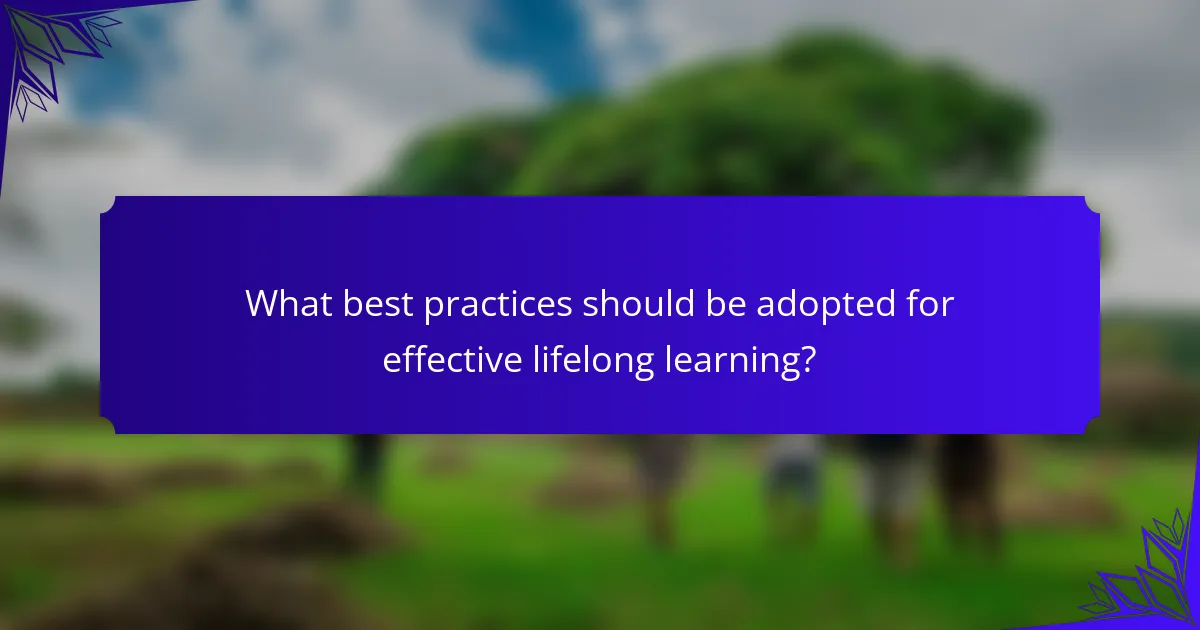
What best practices should be adopted for effective lifelong learning?
To foster effective lifelong learning, adopt adaptive techniques, utilize digital tools, and integrate mindfulness practices. These strategies enhance engagement and retention in learning processes.
Adaptive techniques, such as personalized learning paths, cater to individual needs, promoting motivation. Digital tools, like e-learning platforms and mobile applications, provide flexibility and accessibility, making learning convenient. Mindfulness practices, including meditation and reflective journaling, enhance focus and cognitive function, supporting sustained learning efforts.
Incorporating these elements creates a holistic approach to lifelong learning, ensuring continuous personal and professional growth.
How can learners stay motivated throughout their educational journey?
Learners can stay motivated throughout their educational journey by utilizing adaptive techniques, digital tools, and mindfulness practices. These strategies create a personalized learning experience that fosters engagement and resilience.
Adaptive techniques, such as personalized learning paths, allow learners to progress at their own pace. Digital tools, like educational apps and online platforms, provide interactive content that keeps learners engaged. Mindfulness practices, including meditation and reflection, help maintain focus and reduce stress, enhancing overall motivation.
Incorporating goal-setting and self-assessment can further sustain motivation. Regularly reviewing progress and celebrating achievements reinforces a sense of accomplishment, driving learners to continue their educational pursuits.
What common mistakes should be avoided in lifelong learning?
To foster lifelong learning, avoid common mistakes like neglecting goal-setting, resisting change, underestimating digital tools, and ignoring mindfulness practices. These errors can hinder personal growth and adaptability. Prioritizing clear objectives enhances focus, while embracing technology facilitates access to resources. Mindfulness cultivates awareness, aiding in the retention of new information.
How can individuals assess their learning progress effectively?
Individuals can assess their learning progress effectively by setting clear goals, utilizing digital tools, and reflecting on their experiences. Clear goals provide a roadmap for what to achieve. Digital tools, such as learning management systems and apps, facilitate tracking progress over time. Reflection allows individuals to identify strengths and areas for improvement, fostering a deeper understanding of their learning journey. Regular assessments, including quizzes and self-evaluations, can also enhance awareness of progress and inform future learning strategies.
What expert insights can enhance the lifelong learning experience?
Expert insights enhance lifelong learning by integrating adaptive techniques, digital tools, and mindfulness practices. Utilizing adaptive learning methods tailors education to individual needs, fostering engagement. Digital tools, such as online courses and educational apps, provide accessibility and flexibility. Mindfulness practices improve focus and retention, creating a conducive learning environment. These combined strategies promote a sustainable lifelong learning journey.
